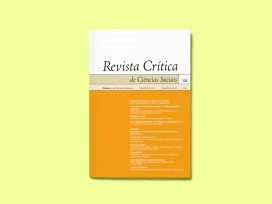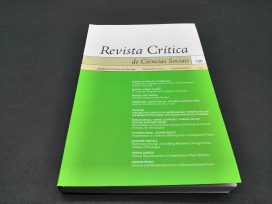Abstracts Revista Crítica 71 (2005)
JOSÉ MANUEL PUREZA & TERESA CRAVO
Critical margin and legitimation in Peace Studies
As a result of being historically constituted as critical knowledge and, thus, as an alternative to normal science in International Relations, Peace Studies came to be co-opted in the 1990s. The regulatory structures of the international system used Peace Studies as the foundation for many of the options they put into practice, especially in postwar reconstruction processes. In this context, recovering the critical lineage of Peace Studies today involves two radical options. The first is the qualification of the intended peace as sustainable peace. The second is the epistemological decolonization of Peace Studies.
HÅKAN WIBERG
Peace Research: Past, present, future
The process of affirmation of peace research as a discipline has been marked at different moments by identity crises, expressed in dense epistemological debates. As a result of its problematic growth, Peace Research is today still dominated by three fundamental questions, which this text attempts to discuss. The first is its orientation towards specific values and policies; the second is related to its place in a contested cognitive territory; the third involves the importance given to non-violence in processes of political change.
VICENT MARTÍNEZ GUZMÁN
Philosophy and Peace Research
As human beings, we have skills for organizing our relationships that make use of war and other types of structural, cultural, and symbolic violence that presuppose the marginalization, exclusion, and death of human beings, and the degradation of the environment. But we also undoubtedly have skills for organizing our relationships in a peaceful way: expressing tenderness and care in interpersonal relations or creating local, state, or global institutions of governance that promote human relations based on justice, as well as relations with nature based on sustainability. In this context, the philosophical challenge of Peace Studies involves the normative reconstruction of our peacemaking skills.
JOHAN GALTUNG
Three forms of violence, three forms of peace. Peace, war, and the Indo-European social formation
In social formations, forms of violence coexist with forms of peace. This article analyzes the coexistence, in the Indo European social formation, of cultural violence (the production of ideas that justify the other forms of violence) with cultural peace (cooperation and empathy with all forms of life); of direct violence (physical elimination of the other) with direct peace (non-violent forms of control, with positive sanctions); and of structural violence (systemic mechanisms of injustice and death) with structural peace (the fulfillment of basic needs and the distribution of goods and services).
TATIANA MOURA
Newest wars, newest peaces. Conceptual and political challenges
This text gives an account of the emergence of a new type of organized armed violence (newest wars), which occurs at an increasingly micro level, but manifests itself, like the new wars, at the global level. The discussion has two aims: first, to make visible and “real” contexts that have been seen as marginal, and that may constitute a prelude to an even more disseminated conflict in the future; second, to stimulate thinking about new ways of responding to the insecurities brought about by this type of newest war.
RODRIGO TAVARES
Why is Europe a peaceful region? A new framework for analysis
Although the pacification of Europe is a process that was set into motion in the early 1950s, it was the fall of the Berlin Wall in 1989 that sparked a flurry of publications that aimed to describe and explain how such an achievement was possible. After this initial theoretical enthusiasm, the current decrease in the research output is proportionally inverse to the growth of integrative linkages in the European Union. This article argues that the old epistemological tools for understanding the pacification of Europe are becoming obsolete as they are embedded in a regional context that no longer exists. In order to overcome this shortcoming, this article introduces a new interpretative framework based on the idea of regional peace and security complexes (RPSC). European RPSC is approached from a comprehensive historical perspective.
ELÍSIO ESTANQUE
Labor, social inequalities, and trade unionism
In recent years, the world of labour has been affected by a vast array of changes in the context of the global economy in which we live and under the effects of different transnational forces and institutions. Resorting to examples from recent empirical studies carried out by the author, the present paper analyzes and discusses the ongoing processes of change, starting from problems related to the world of labour and connecting them to the broader issue of inequalities and social classes. The main aim is to make a diagnosis and a critical interpretation of some of those changes in Portuguese society, showing their relevance, significance, and implications for trade unionism. Thus, after a critical reflection on the new lines of segmentation of the labour market and social inequalities, the text points to a set of questions concerning trade unionism, offering points for further critical reflection and analysis of the experiences and problems which it currently confronts.
HERMES AUGUSTO COSTA
The international policy of CGTP and CUT: Stages, themes, and challenges
Although it exists within national trade union organizations, international relations policy (IRP) is like a “poor relative” of national trade unionism. The first part of this text briefly describes some of the current obstacles to the construction of an IRP; the second part addresses the space that the two major union confederations of Portugal and Brazil (CGTP and CUT, respectively) have been giving to an IRP. Based on research conducted in the last five years on these union confederations, the author proposes a distribution of IRP stages for CGTP and CUT, summarizing, in the third part, the similarities and differences between the two with regards to this issue.
Published 14 July 2005
Original in Portuguese
Contributed by Revista Crítica de Ciências Sociais © Revista Crítica de Ciências Sociais Eurozine
PDF/PRINTNewsletter
Subscribe to know what’s worth thinking about.



